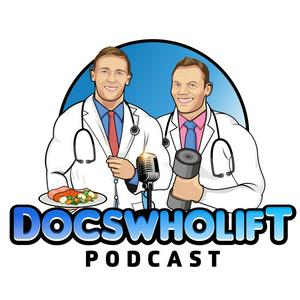143 episodios
- Get The Lucky Egg Book Here
Takeaways:
Dr. Lucky Sekhon is a reproductive endocrinologist and author of 'The Lucky Egg'.
The pathway to reproductive endocrinology involves extensive training in OB-GYN and specialized fellowship.
Social media became a tool for Dr. Sekhon to combat misinformation during the pandemic.
Common myths in fertility include the idea that one can reverse the biological clock.
Understanding the fertility knowledge gap is crucial for patients seeking help.
Insulin resistance plays a significant role in fertility issues, especially in women with PCOS.
Fertility treatments should be evidence-based and tailored to individual needs.
GLP-1 medications can help regulate menstrual cycles and improve fertility outcomes.
Endometriosis can significantly impact fertility and requires tailored treatment approaches.
The importance of patient education in navigating fertility treatments cannot be overstated.
Hosted by Simplecast, an AdsWizz company. See pcm.adswizz.com for information about our collection and use of personal data for advertising. - Takeaways
Excellence is not a standard but a process of becoming.
Involved engagement means caring deeply about what you do.
The pursuit of excellence shapes you into a better person.
Consistency is key to achieving long-term goals.
It's important to align your pursuits with your values.
Youth sports can be beneficial but also harmful if not approached correctly.
Weight loss should shift from a focus on numbers to health and well-being.
Building a diverse identity can help prevent burnout in athletes.
The transition out of sports can be challenging due to identity loss.
Enjoying the process is more fulfilling than the end goal.
Tap or Click Here to Buy Brads Book
Hosted by Simplecast, an AdsWizz company. See pcm.adswizz.com for information about our collection and use of personal data for advertising. - Key Episode Takeaways
Oral Wegovy is real, but it’s not “just a pill version of the shot.” Absorption rules, dosing schedules, and patient selection matter a lot more than most headlines suggest.
Switching from injections to oral GLP-1s requires a plan. The transition isn’t one-size-fits-all, and dose timing, GI tolerance, and expectations need to be managed carefully.
Weight regain after stopping GLP-1s is common, but not universal. SURMOUNT-4 data shows large variability, reinforcing that biology, not willpower, drives outcomes.
Maintenance matters as much as weight loss. Some patients need continued therapy at lower doses, while others may maintain with lifestyle plus strategic medication use.
Stopping abruptly is usually the worst approach. Gradual transitions and realistic long-term strategies reduce rebound weight gain.
GLP-1s are chronic disease tools, not short-term fixes. Treating obesity like hypertension or diabetes leads to better outcomes and fewer surprises.
Hosted by Simplecast, an AdsWizz company. See pcm.adswizz.com for information about our collection and use of personal data for advertising. - Takeaways:
Dietary guidelines have evolved since the 1980s.
The food pyramid was introduced in 1992 and has influenced public perception.
New dietary guidelines emphasize healthy fats but retain some old recommendations.
There are contradictions in the new guidelines regarding saturated fat and protein intake.
The definition of processed foods remains vague and controversial.
The guidelines are intended for healthcare professionals, not consumers.
Public policy needs to align with dietary guidelines for effective implementation.
The emphasis on real food is not a new concept in dietary guidelines.
There is skepticism about whether the new guidelines will lead to meaningful changes in public health.
The conversation around dietary guidelines is often politically charged.
Follow Kevin: Tap Here
Hosted by Simplecast, an AdsWizz company. See pcm.adswizz.com for information about our collection and use of personal data for advertising. - Takeaways:
Cortisol is essential for various bodily functions, especially during stress.
Adrenal glands have a circadian rhythm that affects cortisol production.
Cushing's syndrome can result from excess cortisol and has specific symptoms.
Diagnosis of adrenal disorders requires careful testing and consideration of symptoms.
Mild autonomous cortisol secretion can complicate diabetes management.
The Catalyst trial explored the effects of cortisol antagonism on diabetes.
Future research may focus on selective glucocorticoid receptor modulators.
Woolly mammoth studies provide insights into historical testosterone levels.
Understanding adrenal health is crucial for effective patient care.
Endocrinologists must navigate the complexities of hormone testing and treatment.
Hosted by Simplecast, an AdsWizz company. See pcm.adswizz.com for information about our collection and use of personal data for advertising.
Más podcasts de Salud y forma física
Podcasts a la moda de Salud y forma física
Acerca de Docs Who Lift
Drs. Spencer and Karl Nadolsky talk about nutrition, medicine, and fitness through the lens of two physicians who lift weights. Both doctors are former NCAA division 1 wrestlers who have gone into medicine. Dr. Spencer Nadolsky is a board certified family physician specialized in obesity medicine and lipidology. Dr. Karl Nadolsky is a board certified endocrinologist also specialized in obesity medicine.
Sitio web del podcastEscucha Docs Who Lift, Radio Fitness Revolucionario y muchos más podcasts de todo el mundo con la aplicación de radio.es

Descarga la app gratuita: radio.es
- Añadir radios y podcasts a favoritos
- Transmisión por Wi-Fi y Bluetooth
- Carplay & Android Auto compatible
- Muchas otras funciones de la app
Descarga la app gratuita: radio.es
- Añadir radios y podcasts a favoritos
- Transmisión por Wi-Fi y Bluetooth
- Carplay & Android Auto compatible
- Muchas otras funciones de la app


Docs Who Lift
Escanea el código,
Descarga la app,
Escucha.
Descarga la app,
Escucha.







































